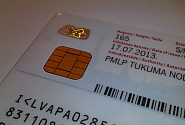
On Thursday, 23 September, the Saeima adopted amendments to the Saeima Election Law and amendments to the Electoral Register Law, which provide for the establishment of an online electoral register.
The laws were amended to provide voters with the opportunity to vote by presenting their identity card (eID card).
As stated in the summary of the amendments, establishment of an electoral register will ensure the right to participate in parliamentary elections for those eligible voters who hold an identity card, but not a valid citizen’s passport. Participation in elections is currently marked in the passport, whereas the amendments will allow marking participation electronically in an electoral register.
According to estimates included in the summary of the amendments, establishment of an online electoral register will cost the Central Election Commission 500 thousand euros, and it will cost the Office of Citizenship and Migration Affairs another 570 thousand euros.
Since the introduction of the eID card in Latvia, holders of an identity card but not a passport could participate in the Saeima elections by presenting a special voter’s card that could be obtained from the Office of Citizenship and Migration Affairs. According to the summary of the Draft Laws, this system creates an additional administrative burden, and can be the reason for a decision to not participate in elections.
The authors of the amendments at the Central Election Commission have indicated that, at the time of the elections of the 13th Saeima, there were over 62 thousand voters whose only identity document was an eID card. Furthermore, the eID card will be a mandatory identity document from 2023, and the number of people who only hold an eID card could exceed 200 thousand by the next Saeima elections.
Saeima Press Service









